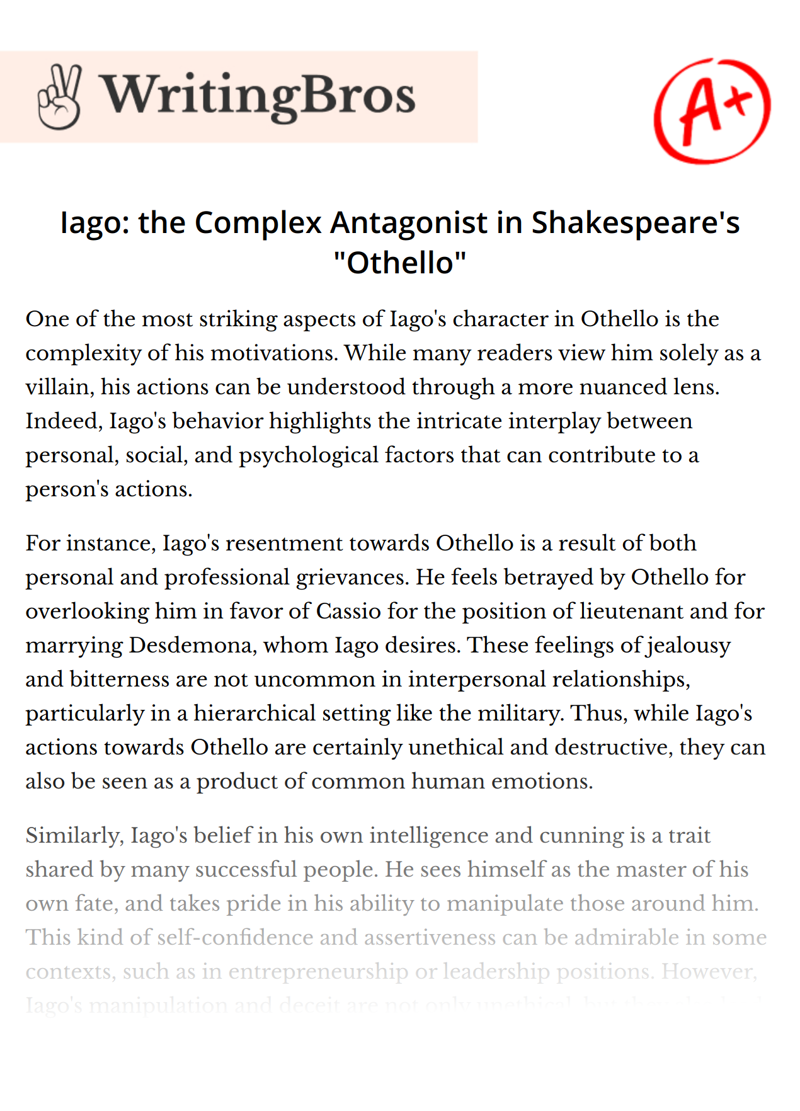Iago: the Complex Antagonist in Shakespeare's "Othello"

One of the most striking aspects of Iago's character in Othello is the complexity of his motivations. While many readers view him solely as a villain, his actions can be understood through a more nuanced lens. Indeed, Iago's behavior highlights the intricate interplay between personal, social, and psychological factors that can contribute to a person's actions.
For instance, Iago's resentment towards Othello is a result of both personal and professional grievances. He feels betrayed by Othello for overlooking him in favor of Cassio for the position of lieutenant and for marrying Desdemona, whom Iago desires. These feelings of jealousy and bitterness are not uncommon in interpersonal relationships, particularly in a hierarchical setting like the military. Thus, while Iago's actions towards Othello are certainly unethical and destructive, they can also be seen as a product of common human emotions.
Similarly, Iago's belief in his own intelligence and cunning is a trait shared by many successful people. He sees himself as the master of his own fate, and takes pride in his ability to manipulate those around him. This kind of self-confidence and assertiveness can be admirable in some contexts, such as in entrepreneurship or leadership positions. However, Iago's manipulation and deceit are not only unethical, but they also lead to the destruction of innocent lives.
Furthermore, Iago's desire for revenge against Cassio and Desdemona highlights the complex interplay between interpersonal relationships and professional aspirations. His actions towards Cassio reflect his insecurities about his position within the military hierarchy, while his resentment towards Desdemona stems from his own romantic rejection. The fact that Iago is willing to go to such great lengths to achieve his revenge is a testament to the powerful influence of emotions on human behavior.
Finally, Iago's personal flaws and psychological issues provide additional insight into his character. He demonstrates a complete lack of empathy, a trait that is often associated with sociopathic behavior. Furthermore, his troubled childhood and difficult upbringing may have contributed to his sense of bitterness and resentment towards those around him. These issues highlight the potential for environmental factors to shape a person's behavior and worldview.
In conclusion, while Iago's actions in Othello are certainly villainous, they can be understood through a more nuanced lens. His behavior is influenced by a complex interplay of personal, social, and psychological factors, including resentment towards Othello, belief in his own intelligence and cunning, desire for revenge against Cassio and Desdemona, and personal flaws and psychological issues. Ultimately, Iago's character serves as a powerful reminder of the potential for darkness and evil within all of us, and the importance of self-reflection and empathy in shaping our actions.
Cite this Essay
To export a reference to this article please select a referencing style below

